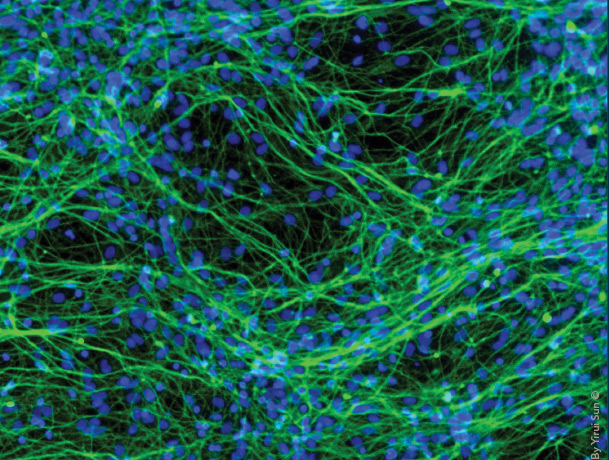
Error: No layouts found

Brain Cells Control Aging
Einstein scientists have found that stem cells in the brain’s hypothalamus govern how fast aging occurs in the body. The finding, made in studies with mice and reported last July in Nature, could lead to new strategies for warding off age-related diseases and extending life spans.
The hypothalamus was known to regulate such important processes as growth, development, reproduction and metabolism. In a 2013 Nature paper, Einstein researchers reported the surprising finding that the hypothalamus also regulates aging throughout the body. Now the scientists have pinpointed the cells in the hypothalamus that control aging: a tiny population of adult neural stem cells, known to be responsible for forming new brain neurons.
“Our research shows that the number of hypothalamic neural stem cells naturally declines over the life of the animal, and this decline accelerates aging,” says senior author Dongsheng Cai, M.D., Ph.D., a professor of molecular pharmacology at Einstein. “But we also found that the effects of this loss are not irreversible. By replenishing these stem cells or the molecules they produce, it’s possible to slow and even reverse various aspects of aging throughout the body.”
In studying whether stem cells in the hypothalamus held the key to aging, the researchers first looked at the fate of those cells as healthy mice got older. The number of hypothalamic stem cells began to diminish when the animals reached about 10 months, which is several months before the usual signs of aging start appearing. “By old age—about two years of age in mice—most of those cells were gone,” says Dr. Cai.
The researchers next wanted to learn if this progressive loss of stem cells actually caused aging and wasn’t merely associated with it, so they observed what happened when they selectively disrupted hypothalamic stem cells in middle-aged mice. “This disruption greatly accelerated aging compared with control mice, and those animals with disrupted stem cells died earlier than normal,” says Dr. Cai.
The hypothalamic stem cells appear to exert their anti-aging effects by releasing molecules called microRNAs (miRNAs), which play key roles in regulating gene expression. They are packaged inside tiny membrane-bound vesicles called exosomes, which hypothalamic stem cells release into the cerebrospinal fluid of mice.
Could adding stem cells to the hypothalamus counteract aging? To find out, the researchers extracted miRNA-containing exosomes from hypothalamic stem cells and injected them into the cerebrospinal fluid of two groups of middle-aged mice: those whose hypothalamic stem cells had been destroyed and normal mice. This treatment significantly slowed or even reversed aging in both groups of animals, as measured by tissue analysis and behavior testing.
Efforts are under way to identify the particular populations of miRNAs and perhaps other factors secreted by these stem cells that are responsible for the anti-aging effects—a first step toward possibly slowing the aging process in humans.